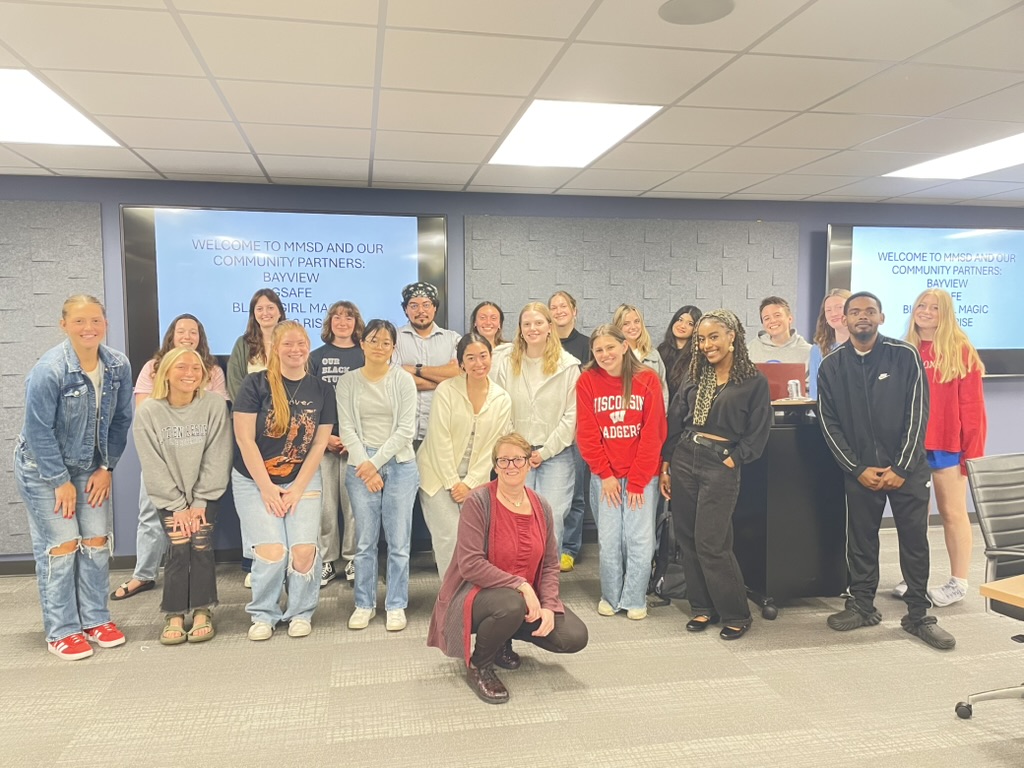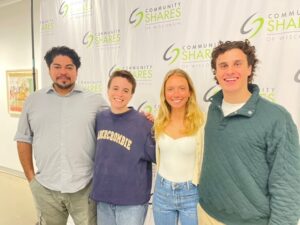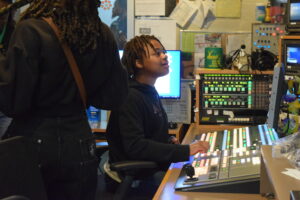
In two courses this spring, Helen Firstbrook Franklin Professor of Journalism Sue Robinson brought the Wisconsin Idea to life, connecting students in two of her courses with the greater Madison community to apply their skills in storytelling, advocacy and strategic communication to pressing real-word issues.
For students in Robinson’s courses, J467: Practicing Communication for Social Change and a Madison Commons directed study, this semester was a crash course in community engagement. They went far beyond the classroom to develop fundraising strategies for nonprofits, train teens in storytelling and shine a light on Madison’s housing challenges. Their work demonstrates the powerful impact that journalists and strategic communicators have when they play an active role in their communities to advance conversations and direct attention to major societal issues.
“The idea is that we embed ourselves in the infrastructure of some problem that needs solving and be solutions-focused, asking ‘how can we move the needle?’” Robinson said. “Journalists are in a key position to be able to do that because we know what’s happening in our community.”
Real-World Lessons in Strategic Communication and Advocacy

In her J467 course, Robinson connected students with four community partners: Root 2 Rise, GSAFE, Bayview Community Foundation and Black Girl Magic Educational Services Inc. The 21 students visited their assigned community partner once a week and were divided into seven teams with three groups training teens in storytelling skills, and the other four working on strategic communication, fundraising, podcasting and other community-based projects.
SJMC senior Molly Zedeck spent the semester developing a digital yearbook for the Bayview Community Foundation. Her team wanted to showcase the programs and initiatives of the organization through event photos so that Bayview could look back at all of the work they had done.
“The opportunity to work with kids and give back to a community that’s given me so much was something that was really intriguing to me,” Zedeck said. “As much as I love Vilas, it was nice to explore a different side of Madison. I have always loved giving back to my community and volunteering so the opportunity to do that for class and spend every Wednesday in a different community was really, really special.”
Housing Insecurity Takes Center Stage in Directed Study
In Robinson’s directed study, her students tackled a different community challenge: housing insecurity. Robinson selected this issue after doing her own work with the UW Odyssey Project, a transitional program for non-traditional students who are low income. After becoming inspired by her work with this program, Robinson connected with other community partners: Madison Tenant Power, the City Community Development Office, Own It: Building Black Wealth and Flyy. For the next year, students enrolled in Robinson’s directed study will write for Madison Commons, UW–Madison’s student-led Dane County news source, about housing insecurity and how it is impacting the community.

While Robinson’s directed study students do not travel to a community location each week, they did have the unique opportunity to travel to Kentucky to learn about a program called the Family Scholar Housing. During their three day stint, the two students who attended visited different housing programs that the UW Odyssey Program was hoping to bring to Madison.
After returning home, the students developed a documentary which premiered at an event the class organized called “Let’s explore a family scholar house program for Madison.” The powerful and moving event included attendees sharing their own stories about housing insecurity while developers listened and discussed possible ideas and solutions.
Throughout the semester the students planned additional events centered around combining their own interests with their affordable housing initiatives. The students found their own guest speakers, developed a Q&A session, produced a series of vignettes and created a podcast to raise awareness of the experiences of unhoused people.
Lessons in Leadership, Flexibility and Inclusive Communication
Through both courses, students are not only applying skills that they have learned at SJMC, they are learning lessons that cannot be taught in the classroom.
“[The students] learn resourcefulness skills. They’re responding to a number of different voices that want input, trying to figure out how to navigate those spaces, learning how to pivot and be flexible, and not to be afraid. That’s one of the hardest things to learn in your skill set,” Robinson said. “[These courses] give autonomy and a sense of ownership in a way that other classes that are not community based don’t. I have to tell them, ‘I am not going to be there, you’re going to be in charge, and if something goes wrong, you’re gonna have to figure that out.’ That’s a really invaluable skill set to learn.”
Understanding how to communicate and collaborate with individuals from diverse backgrounds and varying perspectives was a key element of the course Robinson aimed to convey to her students, and Zedeck showed that the goal was accomplished during her experience.

“The students are coming from a wide range of backgrounds, so what this class is really supposed to do is introduce our UW students to a lot of different people and perspectives, many of which they have never heard before,” Robinson said. “We need to understand the full scope of our responsibilities as professional communicators and understand all of the audiences in which we have responsibilities to reach.”
For Zedeck, the skills she gained over the semester was extremely rewarding and will benefit her far beyond her time at the SJMC.
“Learning to take initiative, be a more inclusive communicator, bring different identities and backgrounds into strategic communication and reporting are all skills I learned this semester,” Zedeck said. “We learned a lot about working with kids, especially kids of different backgrounds than us, so I’ve definitely developed more patience. We learned how to meet kids where they were and really be a resource for them.”
Robinson’s courses are an opportunity for current students to connect with, learn from and inspire the next generation of communicators and community members. While this relationship was formed throughout the semester, it was capped off when the class welcomed the organizations to Vilas Hall for tours of WSUM and PBS Wisconsin as well as a celebratory pizza party.
“The work we’re doing is showing these kids, ‘hey, we’re college students, you could be a college student, and UW is not a place that you have to avoid,’” Robinson said.
These courses would not have been possible without the support of the Morgridge Center for Public Service which provided students with transportation to and from their assigned site locations as well as the trip to Kentucky. The organization also provided a project assistant for site supervision and helped foster the connection between the university and the non-profits by funding the end of the semester celebration in Vilas Hall.